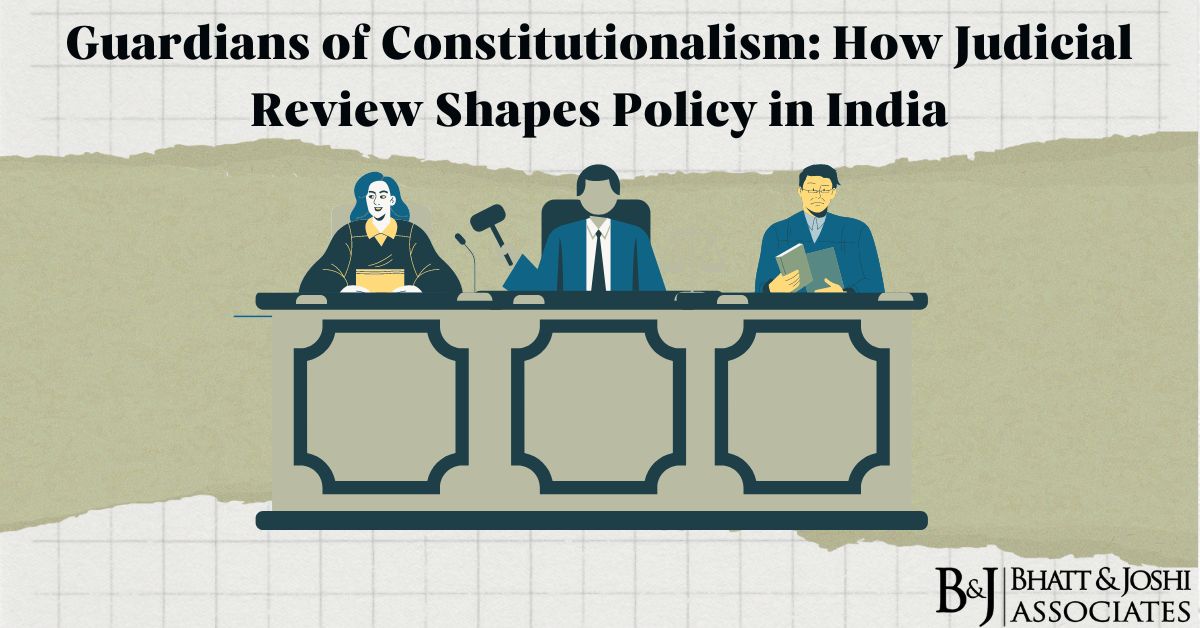Judicial Review: A Catalyst for Policy Evolution and Democratic Resilience in India

Introduction
In a lecture delivered at Harvard Kennedy School, Justice BR Gavai expounded upon the theme “How Judicial Review Shapes Policy.” This discourse delved into the intricate relationship between judicial review and policymaking, highlighting the proactive role of the Indian Judiciary in upholding constitutional principles amidst executive lapses. Justice Gavai’s insights shed light on the evolving dynamics of judicial review within the Indian legal framework, emphasizing its significance in fostering accountability, transparency, and societal progress.
The Imperative of Judicial Review and Intervention
Justice Gavai commenced his lecture by asserting the imperative for judicial intervention when the executive branch fails to fulfill its duties. He emphasized that constitutional courts cannot remain passive observers in such scenarios but must actively safeguard citizens’ rights and uphold constitutional values. This proactive stance underscores the judiciary’s pivotal role as a guardian of constitutionalism, ensuring the harmonious functioning of democratic institutions.
Evolution of Judicial Review in India
The discourse then shifted focus to the evolution of judicial review within the Indian legal framework. Justice Gavai elucidated how the Indian Judiciary has adapted to the changing societal landscape, evolving new constitutional mechanisms to address emerging challenges. Drawing parallels with the development of Public Interest Litigation (PIL), he highlighted the judiciary’s innovative approach in promoting citizen participation and amplifying marginalized voices. This evolution underscores the judiciary’s commitment to fostering inclusive policymaking and ensuring equitable access to justice for all citizens.
Prominence of Public Interest Litigation (PIL)
One of the hallmarks of judicial activism in India is the prominence of Public Interest Litigation (PIL). Justice Gavai elaborated on the transformative impact of PIL in expanding access to justice and promoting social justice objectives. PIL has served as a potent tool for addressing systemic injustices and advancing the rights of marginalized communities. By relaxing traditional standing requirements, the judiciary has empowered citizens to advocate for societal change and hold the government accountable for its actions.
Role of Judicial Review in Shaping Public Policy
Justice Gavai underscored the instrumental role of judicial review in shaping public policy and reinforcing democratic values. He cited several landmark judgments where the judiciary intervened to rectify governmental deficiencies and uphold constitutional principles. From striking down the electoral bond scheme to introducing the NOTA option, these decisions exemplify the judiciary’s commitment to enhancing electoral transparency and accountability. Through judicious application of judicial review, the judiciary ensures that governmental actions are consistent with constitutional mandates and serve the public interest.
Scrutinizing Administrative Actions
A critical aspect of judicial review is scrutinizing administrative actions to ensure their conformity with constitutional norms. Justice Gavai elaborated on the judiciary’s role in reviewing government decisions and policies to prevent overreach and safeguard fundamental rights. He cited the Tata Cellular v. Union of India case as an example, where the Supreme Court reviewed the government’s tender processes to ensure fairness and legality. By exercising judicial oversight, the judiciary ensures that administrative actions are fair, just, and in accordance with the rule of law.
Rectifying Biased Administrative Actions
Justice Gavai highlighted instances where the judiciary intervened to rectify biased administrative actions and uphold constitutional principles. He referenced the Union of India v. Ex. Lt. Selina John case, where the Supreme Court struck down a policy that unfairly penalized a female military nursing officer for getting married. This decision underscored the judiciary’s commitment to gender equality and non-discrimination, setting a precedent for fair and equitable treatment under the law.
Introducing Dialogical Judicial Review
A novel concept introduced by Justice Gavai is “dialogical judicial review,” which emphasizes constructive dialogue between the judiciary, government, and stakeholders to address societal challenges and ensure policy efficacy. Through dialogical review, the judiciary seeks transparency, accountability, and effective policy implementation, especially evident during the COVID-19 crisis. By engaging in dialogue with the government, the judiciary can provide valuable insights and recommendations to improve policymaking and enhance public welfare.
The Judiciary’s Role in Crisis Management
Justice Gavai highlighted the judiciary’s crucial role in crisis management, particularly during the COVID-19 pandemic. He underscored the importance of judicial intervention in ensuring fair and transparent distribution of healthcare resources and vaccines. Through dialogical review, the judiciary engaged with the government to address the challenges posed by the pandemic and safeguard civil liberties. This proactive approach demonstrates the judiciary’s commitment to upholding constitutional values even in times of crisis.
Conclusion
In conclusion, Justice BR Gavai’s lecture elucidates the transformative impact of judicial review on policymaking and governance in India. By upholding constitutional principles, promoting accountability, and fostering inclusive dialogue, the judiciary plays a vital role in shaping public policy and advancing societal progress. As a guardian of constitutionalism, the judiciary ensures that governmental actions are consistent with the rule of law and serve the public interest. Through proactive intervention and dialogical engagement, the judiciary contributes to the resilience and vibrancy of India’s democratic institutions, reaffirming its indispensable role in upholding the rule of law and promoting justice for all citizens.
 Whatsapp
Whatsapp

